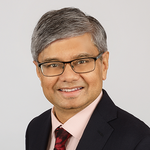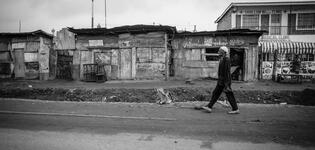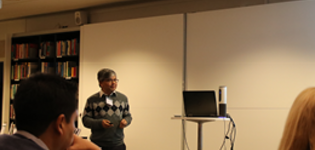Blog
Transforming economies, states, and societies – building evidence for achieving the SDGs
I am delighted to take the helm at UNU-WIDER, an institution which has been associated with some of the most advanced thinking in development economics. UNU-WIDER has combined outstanding research with sustained policy engagement on some of the most pressing concerns affecting the living standards of the world’s poorest people.
WIDER impact
Over the past 33 years, and most recently under the leadership of my predecessor, Finn Tarp, in the last 10 years, UNU-WIDER has significantly advanced our understanding of the causes of poverty and inequality, climate change, the roots of gender inequality, and the challenges of structural transformation for low-income countries. Following on from Finn is a daunting prospect, but I look forward to working with my colleagues at UNU-WIDER and with our many partners to build on the achievements of the past 10 years.
I was first acquainted with UNU-WIDER as a graduate student in the United States in the late 1980s. I came across several of the institutes publications which became classics in the field of development economics, including Hunger and Public Action by Jean Dreze and Amartya Sen, and Varieties of Stabilization Experience by Lance Taylor. These publications had a profound impact on my own thinking, and since then many other UNU-WIDER publications have had similar transformative effects on successive generations of social scientists. In a world where there are increasing asymmetries of knowledge creation and sharing between the Global North and South, UNU-WIDER is ideally placed to use the power of its global network to address the pressing questions in development.
The three interconnected transformations necessary to achieve the SDGs
In the new year, we launched our new work programme for 2019–23. This will be the most ambitious work programme that UNU-WIDER has undertaken so far. I believe the challenge of development is ultimately a question of transformation — how to bring about broad-based sustained improvement in multiple dimensions of wellbeing necessary to achieve the Sustainable Development Goals (SDGs). This involves transformation in three different dimensions: economies, polities, societies. The new work programme will address these dimensions of transformation, which will become the thematic foci of UNU-WIDER’s research in the coming years: Transforming Economies, Transforming States, and Transforming Societies.
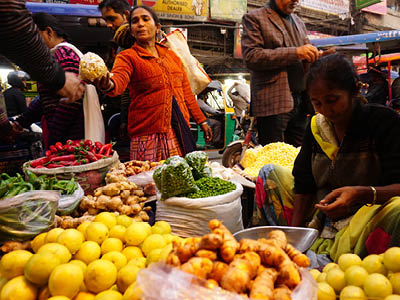 Transforming Economies — the first thematic focus of UNU-WIDER’s new work programme — is at the core of any meaningful development strategy and set of policies. Large-scale changes in the structure of economic activity and employment opportunities must take place if absolute poverty is to be reduced alongside addressing economic and social inequalities. Economic transformation is also essential in delivering higher levels of income and increasing market activity. These are critically needed to improve the mobilization of domestic resources and establish an enlarged tax base that can finance the investments needed to achieve the SDGs.
Transforming Economies — the first thematic focus of UNU-WIDER’s new work programme — is at the core of any meaningful development strategy and set of policies. Large-scale changes in the structure of economic activity and employment opportunities must take place if absolute poverty is to be reduced alongside addressing economic and social inequalities. Economic transformation is also essential in delivering higher levels of income and increasing market activity. These are critically needed to improve the mobilization of domestic resources and establish an enlarged tax base that can finance the investments needed to achieve the SDGs.
But for meaningful economic transformation to take place, there needs to be a political transformation as well. This is why Transforming States will be the second thematic focus of UNU-WIDER’s work programme. Capable and effective states are needed to work with the private sector to achieve higher rates of economic growth, but also to bring about a shift to more environmentally sustainable production. At the same time, the state has a key role to play in providing necessary public goods and in shaping the transformation of societies in ways that yield greater empowerment — through proactive policies to help reduce marginalization of the poor and to achieve greater gender equality. Accountable states that are responsive to the needs of their citizens are an essential factor in national development. The challenge is to build capable and legitimate states in difficult contexts, especially in fragile and conflict-affected environments.
The third thematic focus of the new work programme is Transforming Societies. Economic and political transformation needs to be accompanied by social transformation, such that every citizen can live in a socially inclusive and egalitarian society. Increasing the capacities, resources, and confidence of individuals and their communities is a means to end poverty and to contain and reduce not only gender inequality, but other social inequalities as well. This is now a pressing concern in many societies, especially when high inequality destabilizes political systems, increases state fragility, and hinders the transformation of economies. The actions of both state and non-state actors (such as non-governmental organizations and community groups) matter in bringing about social transformation. The challenge for us is to understand the conditions under which such actions are possible, and when they can become transformative.
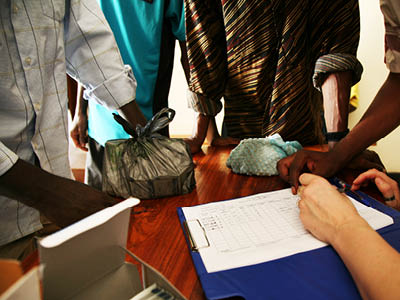 How will we get there?
How will we get there?
These three themes are at the very centre of the UN’s 2030 Agenda for Sustainable Development. Much of our work will include mobilizing policy research, evidence, and action around selected goals of the 2030 Agenda as well as responding to the Agenda’s ‘call for increased support for strengthening data collection and capacity-building in Member States’. With the three transformations in mind we will start the work with launching six flagship projects in 2019 — on informality, women’s work, social mobility, building capable states, structural transformation, and extractives.
Join our efforts!
As always, we welcome the UNU-WIDER network to engage with us in thinking through and taking action for a more sustainable and equitable future for all. How can this be practically done? Keep an eye on calls for papers and research proposals coming out throughout the year, apply for visiting scholar or PhD fellowhip in order to visit and work with us.
Right now we have an open call for papers for the next WIDER development conference, being held 11-13 September 2019 in Bangkok, in partnership with UNESCAP. The theme of the conference is Transforming Economies – for Better Jobs. We welcome submissions of proposals from you and I hope to meet many of you in Bangkok — it is your active participation in UNU-WIDER’s development conferences that have made these events the successes that they are.
Kunal Sen is the Director of UNU-WIDER. Follow him on Twitter @kunalsen5.
The views expressed in this piece are those of the author(s), and do not necessarily reflect the views of the Institute or the United Nations University, nor the programme/project donors.
 Join the network
Join the network